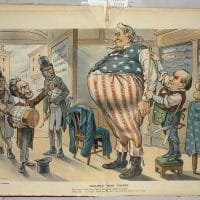-
Puerto Rico’s $123 Billion Bankruptcy Is the Cost of U.S. Colonialism
Last week Puerto Rico officially became the largest bankruptcy case in the history of the American public bond market. On May 3, a fiscal control board imposed on the island’s government by Washington less than year ago suddenly announced that the Puerto Rico’s economic crisis “has reached a breaking point.” The board asked for the immediate […]
-
The Graveyard of Progressive Social Movements
When first encountering the “Impeach Bush” movement in 2007 I responded, almost flippantly, “why not impeach the system that gave us Bush?” Otherwise, I said, “we risk having someone in the White House who’ll make us long for Bush.” If prescient, my response was admittedly formulaic and evidentially deficient.
-
Which Countries Live Within Their (Ecological) Means?
The information contained within the 2017 edition of the National Footprint Accounts, and especially its elegant publishing platform, will be useful to critics of the status quo maintained by the major capitalist economic powers. To make sense of the data critically, however, one must go far beyond the explanation given below, as root causes are […]
-
Road to Trump’s Climate Change Hell Paved by Obama and Clinton
Monthly Review Press author Gerald Horne, Robert Pollin and Paul Jay discuss the debate within the Trump White House on whether to leave the Paris climate accords or just undermine them; and how this relates to the fight within the Democratic Party.
-
Slandering Populism
Populism properly understood is about popular and democratic opposition to the rule of the money power—to the reign of concentrated wealth. It emerged from radical farmers’ fight for social and economic justice and democracy against the plutocracy of the nation’s Robber Baron capitalists during the late 19th century. It was a movement of the left.
-
“To preserve peace in Venezuela, there’s no choice but to convene nationwide dialogue to reform the Constitution”
From El Salvador, where the meeting of Chancellors of the Community of Latin American and Caribbean States (CELAC) is being held, the Minister of Education and leader of the Presidential Commission of the Constituent National Assembly affirmed that one of his goals is to restore the principle of cooperation of the powers, because that’s the only way to preserve peace in the country given the opposition’s lack of will to dialogue.
-
Curiouser and Curiouser
A story worthy of a mystery author—or dramatist—has been hitting German headlines. It began when police at the Vienna airport in Austria arrested a first lieutenant of the German Bundeswehr army when he picked up a pistol hidden some weeks earlier in a bathroom. He denied it was his and was released. But his fingerprints somehow matched those of a refugee who had applied for German asylum two years earlier
-
The Promises and Limitations of Radical Local Politics
Read Michael D Yates’s informative interview with labor journalist Steve Early and Mike Parker, leader of the Richmond Progressive Alliance. The conversation focuses on both the benefits and limitations of engaging in radical politics at the local level.
-
What’s driving abnormal profit margins? Monopoly
Why is the cause of abnormally high corporate profit margins in the US. The phenomenon is amongst other things upsetting the standard notion that profits are mean reverting to historic averages. Jeremy Grantham (of the global investment management firm, GMO) puts the cause down to three other factors: increased monopoly power, increased political power and increased brand power.
-
The Steps to Ecosocialism
John Bellamy Foster and Ian Angus reply to a recent article published by Daniel Tanuro on carbon pricing schemes. Tanuro, a vehement critic of such schemes, focuses his critique on the cautiously critical support given by Foster and Angus to proposals developed by climate scientist James Hansen.
-
The Return of Commercial Prison Labor
In the decades following, the number of prisoners decreased to a historic minimum. But with cutbacks in the welfare state, the prison population exploded from about 200,000 in 1975 to 2,300,000 in 2013 (Scherrer and Shah, 2017: 37) and prison labor for commercial purposes became legal again. Today, about 15% of the inmates in federal and state prisons perform work for companies such as Boeing, Starbucks and Victoria’s Secret. Migrants detained for violating immigration laws are one of the fastest growing segments of prison labor. Under the Trump administration, their numbers are most likely to increase.
-
Russia-Baiting Pushed Trump to Attack Syria—and Increases the Risk of Nuclear Annihilation
The anti-Russia bandwagon has gained so much momentum that a national frenzy is boosting the odds of unfathomable catastrophe. Vast efforts to portray Donald Trump as Vladimir Putin’s flunky have given Trump huge incentives to prove otherwise. Last Thursday, he began the process in a big way by ordering a missile attack on Russia’s close […]
-
With Krleža, Against Organized Idiotism
Krleža writes about imperialist wars, corruption, oligarchy, plutocracy, the miserable life under the dictatorship of capital, and so on. Moreover, he writes from the perspective of a revolutionary socialist. Almost a century later all of those Krleža’s early themes are still critically and tragically topical. Various versions of ostensible socialism are today thoroughly discredited, but it could be said that socialism as such—in its authentic, humanistic version—remains a valid option for humanity.
-
Miracles Can Happen
To follow German politics these days you have to like arithmetic. At first only up to six, for that many parties are now vying to get good grades, lots of votes, and more power in the September elections to the Bundestag, which will lead to a government ruling until 2021.
-
The Much-Maligned Views of Rania Khalek on Syria
The people that have written about Rania [Khalek] publicly range from truly creepy stalkers to left academics who fired off a quick set of libels and then expressed dismay at the responses to them. But other than people talking about her, it is in fact rather difficult to find any sources for these “views” of hers that apparently disqualify her to speak or publish on any topic.
-
Just Wait Until I Get Tenure
The first thing to understand about colleges and universities is that they are workplaces. And like all workplaces in capitalist societies, they are organized as hierarchies, with power radiating downward.… Those at the top have as their central objective control over the enterprise, so that their power can be maintained, that revenues from tuition, grants, money from various levels of government, and the like keep flowing in, that the prestige of the college or university grows. And, of great importance, that those below them do not and cannot make trouble by challenging their authority.
-
Monopolization and labor exploitation
Those who advocate “freeing the market” claim that doing so will encourage competition and thereby increase majority well-being. These advocates have certainly had their way shaping economic policies. And the results? According to several leading economists, the results include the growing monopolization of product markets and the steady decline in labour’s share of national income. Neither outcome desirable.
-
Medicare for All?
On Friday, House Republicans failed to muster enough support to pass the GOP healthcare plan, which some call Trumpcare. In response, Vermont Senator Bernie Sanders has announced he will soon introduce a bill to create a single-payer healthcare system. Several progressive groups are backing a single-payer system, including the Working Families Party, the Progressive Campaign Change Committee, CREDO, Social Security Works and National Nurses United. For more, we speak with Dr. Steffie Woolhandler, co-founder of Physicians for a National Health Program. She is a professor at CUNY-Hunter College and a primary care physician. She is also a lecturer at Harvard Medical School.
-
Kendeng Against Cement
Since March 13, 2017, over 50 local indigenous peasants known as Sedulur Kendeng, from Central Java, Indonesia, have been sitting with their feet in cement boxes in protest before the Presidential Palace. This is their second such protest in eleven months.
-
Cementing Dissent in Indonesia
The accelerating rate of land and resource dispossession in post-authoritarian Indonesia has led to a number of confrontations between state and corporate authorities on one side and peasant communities on the other. Many of these conflicts, though garnering much attention from sympathetic activists, remain localised. However, there are moments when peasants and their activist allies decide to scale up their direct action.



















